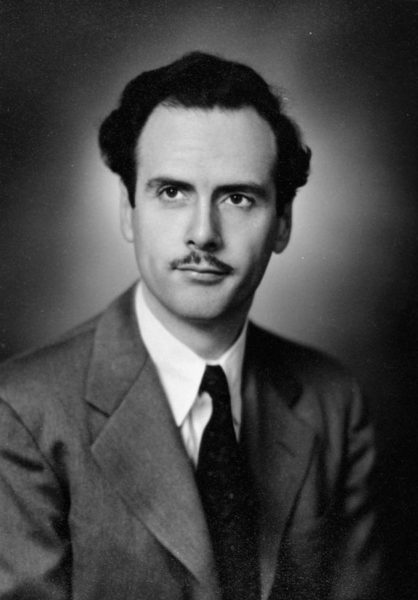In Quillette, Graham Majin looks at the life and works of Marshall McLuhan:

Marshall McLuhan, 1945.
Library and Archives Canada reference number PA-172791 via Wikimedia Commons.
The media ecosystem of the early 21st century is marked by a collapse of trust in journalism. How did we get here? As we look back, like a detective searching for clues, one moment stands out as significant; the publication on March 1st, 1962, of The Gutenberg Galaxy, written by a then-obscure Canadian academic named Marshall McLuhan. This book set in motion a line of falling dominoes, the consequences of which continue to affect us profoundly today.
McLuhan came to be regarded by the Baby Boomer generation as a guru and prophet; a visionary who had discovered something profound, not merely about the media, but about life and the universe. During the 1960s, he became a major celebrity, especially in the US. He featured on the cover of Newsweek magazine, was frequently interviewed on TV, and made a cameo appearance in Woody Allen’s 1977 movie Annie Hall. There was even a prog rock band named in his honor. The American media historian Aniko Bodroghkozy writes that “no other figure who was not of the movement itself received so much positive notice in the alternative newspapers that served dissident youth communities.” In 1965, the celebrity journalist Tom Wolfe asked breathlessly, “Suppose he is what he sounds like, the most important thinker since Newton, Darwin, Freud, Einstein, Pavlov?” Wolfe described McLuhan as an almost Christ-like figure:
A lot of McLuhanites have started speaking of him as a prophet. It is only partly his visions of the future. It is more his extraordinary attitude, his demeanor, his qualities of monomania, of mission. He doesn’t debate other scholars, much less TV executives. He is not competing for status; he is alone on a vast unseen terrain, the walker through walls, the X-ray eye.
Writing in 1967, John Quirk agreed that McLuhan was a “savant and prophet” and explained that, “McLuhanites hold that the new technologies will lend men the awareness and instruments necessary to solve contemporary problems and inaugurate a bright new era.” McLuhan was a master of the catchy one-liner and the original source of Timothy Leary’s famous counterculture catchphrase, “Turn on, tune in, drop out.”
McLuhan’s division of media into two types was certainly influential although that influence wasn’t particularly useful:
In The Gutenberg Galaxy, McLuhan observed that the decline of Catholicism, the rise of Protestantism, and the drift towards secularism all coincided with the development of printing. He hypothesized that the invention of printing had produced the European Enlightenment and Victorian liberal democracy. It was not what was printed, but printing itself that was responsible. McLuhan classified all media into two types: “hot” and “cool”. Printed books and newspapers, he suggested, were “hot” because they were bursting with information. Pre-Renaissance forms of communication, on the other hand, like the spoken Catholic Mass, were “cool”. This was because the Mass was spoken in Latin and hence contained little or no information that ordinary people could understand. Handwritten books were also categorized as “cool”.
Baby Boomers were quite receptive to McLuhan’s message, as it told them very much the sort of thing they wanted to hear:
He had produced a Boomer-friendly, sanitized version of his thesis in which magic and fantasy replaced religion. He also took care to flatter his Boomer audience by telling them that they were uniquely in tune with a deeper reality their parents could not see or understand. “We of the TV age,” he wrote, “are cool. The waltz was a hot, fast mechanical dance suited to the industrial time in its moods of pomp and circumstance. In contrast, the Twist is a cool, involved and chatty form of improvised gesture.”
McLuhan told the Boomers that they might appear irrational to their parents, but this was simply because the old generation was raised on obsolete “hot” media. As a result, he said, they had lost touch with their emotional side and become unnaturally rational and impartial: “Phonetic culture endows men with the means of repressing their feelings and emotions when engaged in action. To act without reacting, without involvement, is the peculiar advantage of Western literate man.”
McLuhan was a key influence on the Boomers, but his ideas failed when logically analyzed:
Trying to deconstruct McLuhan’s arguments reveals glaring absurdities. For example, it is self-defeating to claim that the content of a message is unimportant. On the contrary, all messages must convey information which corresponds with, or claims to correspond with, some state of affairs in the real world if they are to be useful. A news article without news, a weather forecast that does not mention the weather, or a traffic report lacking information about traffic might all be deliciously McLuhanesque, but they are not helpful. Even the Bible, revered by McLuhan, would be meaningless if it were merely a book of random words and blank pages. As Finklestein summarized, McLuhan’s argument is “absurd, when analyzed.”
McLuhan might well be the patron saint of fake news.



